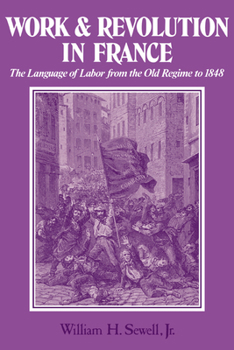Work and Revolution in France: The Language of Labor from the Old Regime to 1848
Select Format
Select Condition 
Book Overview
Work and Revolution in France is particularly appropriate for students of French history interested in the crucial revolutions that took place in 1789, 1830, and 1848. Sewell has reconstructed the artisans' world from the corporate communities of the old regime, through the revolutions in 1789 and 1830, to the socialist experiments of 1848. Research has revealed that the most important class struggles took place in craft workshops, not in 'dark satanic...
Format:Paperback
Language:English
ISBN:0521299519
ISBN13:9780521299510
Release Date:October 1980
Publisher:Cambridge University Press
Length:352 Pages
Weight:1.06 lbs.
Dimensions:0.7" x 5.8" x 8.9"
Customer Reviews
1 rating
Early Benchmark in Post-Modern Historical Methods
Published by Thriftbooks.com User , 19 years ago
William H. Sewell argues that the analysis of early nineteenth century French labor idiom reveals its roots were firmly established in Ancien Regime artisan corporations. Revealing what the author calls a "little- noticed paradox," Sewell discovered "the discourse of revolutionary workers of 1848 was laced with seemingly archaic terminology dating from the guild and corporate system of the old regime ... founded on a very old sense of craft community." Although intended to incorporate the elements of social history and langage, Sewell adds that a thorough understanding of the overall political perspective is essential to this well-rounded study. His argument is convincing and his methods, at the time of publication, must have shed new light on the historical profession. Sewell is up front about the limitations of his study and the methods he incorporates, however. Admitting he prefers to avoid existing historiographical debates, the author stresses he is "attempting to sketch out a new map that will indicate relations between already explored regions and suggest useful approaches to those not yet explored." Pointing out that historical evidence of labor, particularly in France, is primarily confined to the local or regional level; Sewell stresses the need to incorporate an overall political ideology into the mix. Paradoxically, however, Sewell warns that political ideology emanating from Paris may not necessarily reflect the thoughts of workers in rural regions of France. In addition, the authorl borrows methods from cultural anthropology to illustrate how such practices as religious festivals shaped peoples ideas and experiences, yet warns that not all sociological practices, such as ethnography, for instance, benefit the historian. For any historian attempting to reveal a "collective conscience" of the French labor before, during, and after the French Revolution, the task is nothing less than daunting. Regardless, his emphasis on historical methods gives strength too the notion of exploring new areas by fusing various fields of the Humanities. Sewell has synthesized his information well. His chronological approach, detailing the origins of corporate practices; particularly the Journeyman's Compagnonnage makes for interesting reading, however, his argument sometimes gets buried in the narrative. By the time the reader reaches the crux of the author's main focus-language (page 179)-one could perhaps become confused and forget the "map" the author so eloquently laid out in his opening chapters. In spite of the main argument sometimes becoming lost in the shuffle, the author's conclusions reveal a well-researched thesis and a significant postmodern contribution to the history of labor.






